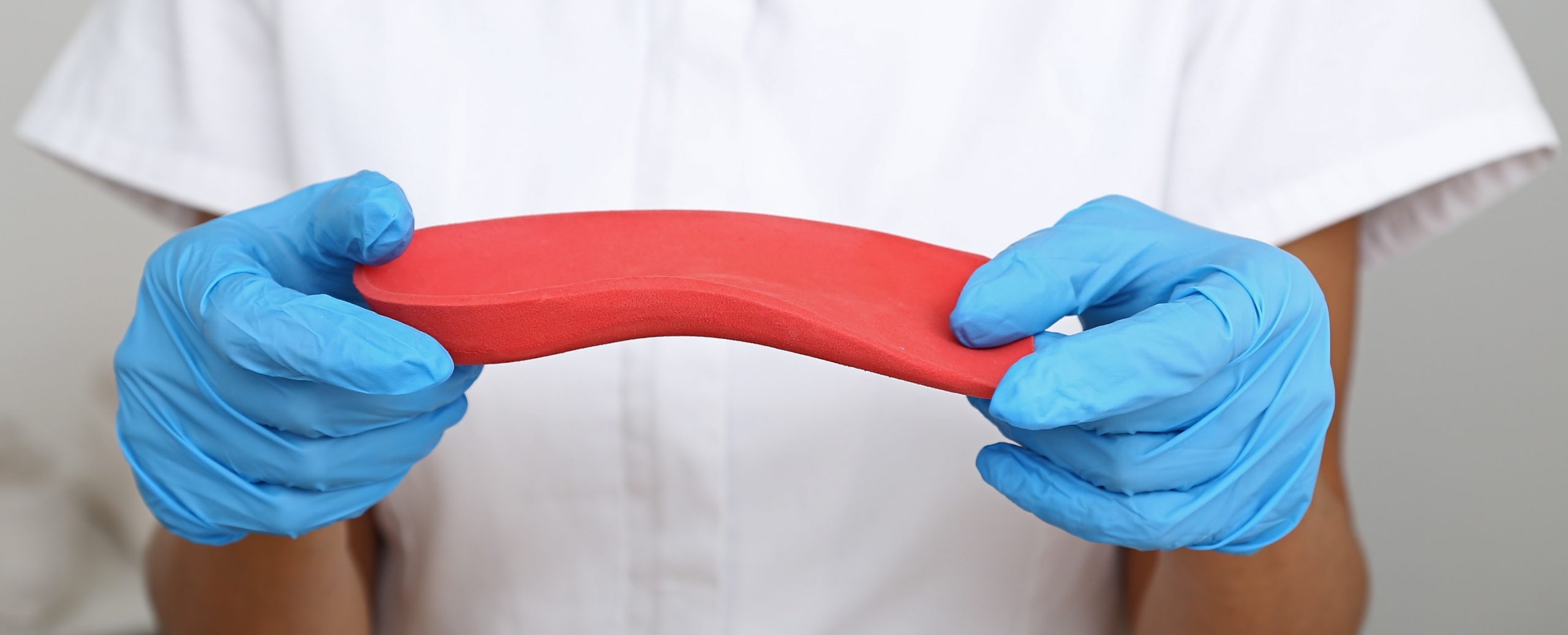Orthotic Insoles
An orthotic insole is a shoe insert designed to help address biomechanical issues in your feet and improve their function. Bespoke orthotic insoles are custom-made to correctly fit your individual feet.
During your biomechanical assessment and gait analysis Rachel Miller may prescribe an orthotic insole as a beneficial non-invasive part of treatment. If a bespoke orthotic is prescribed, Rachel makes a cast of your foot in that consultation from which a hand-made orthosis will be fashioned and individualised to your exact needs.
Orthotic insoles may help correct structural imbalances, support, cushion and improve foot function and can alleviate some painful conditions. An orthotic insole may also help an athlete improve their performance by making exercise more mechanically and energy efficient. Rachel chooses the best possible materials and densities for your orthoses for both support and shock absorption.
See below for more information about orthotic insoles, costs and clinic details. See the Biomechanics page or more information about biomechanical assessments.
Call 020 8348 5553 to make an appointment
Orthotic insoles
A custom-made insole fits the individual characteristics of your foot. An orthotic insole slips comfortably into shoes and trainers which may help improve deficiencies in gait, correct structural imbalances, support, cushion and improve foot function. Orthotic insoles can help redistribute pressure which may reduce stress on toes and joints. An orthotic insole may alleviate heel, ankle, foot, knee, hip, back and neck pain.
Some conditions that an orthotic insole may benefit include:
- Achilles tendinitis/tendinopathy
- Ankle injuries
- Back pain
- Flat feet that are causing pain
- Heel pain
- Knee pain
- Metatarsalgia
- Overuse injuries
- Patellofemoral pain syndrome (runner’s knee)
- Plantar fasciitis
Bespoke orthoses can be made to fit different types of shoes, be of different lengths, can be slimline or more supportive. An orthosis can be of different materials and densities depending on their purpose and the condition you present.
Cast
During your consultation, if you are prescribed a bespoke orthotic insole, a cast is taken of your foot. From this cast, based on the precise shape of your foot, an orthotic insole is made using the very best of materials for both shock absorption and support. You can be prescribed a range of orthotic insole materials which will depend on your individual needs and condition.
Manufacture
Rachel ensures your orthotic insoles are crafted exactly to your needs. Working in the field of biomechanics and orthoses for many years does mean that Rachel has mastered the techniques to give an expert biomechanical assessment, take a precise cast to help create a bespoke orthotic insole that can effectively help you. Orthotic insoles are hand-made from the cast and meticulously fashioned to be individualised to your exact needs. Rachel chooses the best possible materials and densities for your orthoses for both support and shock absorption to help improve foot function.
Follow-up consultation
If a bespoke orthotic insole is being made for you, there is a free consultation three to four weeks after your initial assessment when Rachel makes sure your orthotic insoles are properly fitted into your shoes or trainers and any adjustments can be made. If you cannot attend the fitting appointment, your orthoses can be sent by post.
Plaster casts are kept in storage to make further orthotic insoles if needed. An orthosis will normally last between 12 – 24 months depending on your age, your condition and type of use. All bespoke orthotic insoles are guaranteed for 18 months and most casts are kept for a minimum of 2 years should you want to order more. Many patients have several orthotics for different shoes making them easier to use and extends their lifespan.
Fee for a biomechanical assessment:
-
- £80 for a one hour biomechanical assessment
If you are prescribed an orthotic insole the cost is:
-
- £80 for the plaster cast
- £160 for a pair of orthotic insoles
Rachel Miller is recognised by most major healthcare insurance companies. There may be a charge for requesting a written medical report.
Contact the clinic for an appointment on 020 8348 5553
Rachel Miller is a highly experienced podiatrist specialising in biomechanics and orthotic insoles. Her clinics are held at Highgate Podiatry in Highgate village, 14 Pond Square, London, N6 6BA, London are every Wednesday, Thursday and Sunday. Contact the clinic for an appointment on 020 8348 5553. For clinic directions and map see the Contact page. See the Biomechanics page for more information about biomechanical assessments.
Links to Services:
Links to Conditions Treated Include:
- Achilles tendinopathy
- Ankle fractures
- Ankle injuries
- Arthritis
- Back pain
- Bunions
- Corns/Calluses
- Diabetic care
- Flat feet
- Fungal toenail/athlete’s foot
- Haglund’s deformity
- Hammer toe and mallet toe
- Heel pain
- High arches
- Hypermobility
- Ingrown toenail
- In-toeing, toe walking, curly toes
- Knee injuries
- Metatarsalgia
- Morton’s neuroma
- Osgood-Schlatter disease
- Overuse injuries
- Patella tendinopathy
- Patellofemoral pain syndrome
- Plantar fasciitis
- Sever’s disease
- Sprained ankles
- Stress fractures
- Tarsal tunnel syndrome
- Toenails






